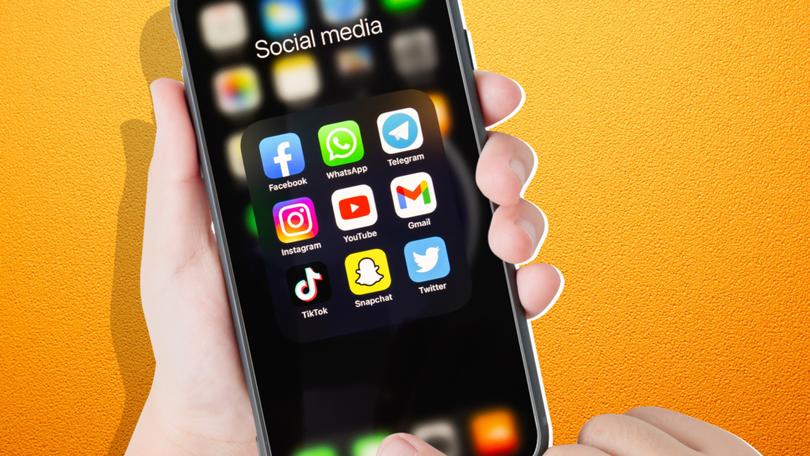Social media ban: Experts slam Albanese announcement for potentially ruining digital literacy of Australia
Plans to introduce age limit laws for social media sites are not the answer to protect children from harmful content because they would be impossible to enforce and only kick the ‘problem down the road’.

Age limit laws for social media sites will not protect children from harmful content as they would be impossible to enforce and only kick the “problem down the road”.
That is the view of social media expert Tama Leaver, who warned banning kids from platforms such as Instagram and Facebook could even harm their digital literacy.
Prime Minister Anthony Albanese revealed the Federal Government would introduce legislation to enforce a minimum age for social media access before the end of 2024.
Sign up to The Nightly's newsletters.
Get the first look at the digital newspaper, curated daily stories and breaking headlines delivered to your inbox.
By continuing you agree to our Terms and Privacy Policy.An age-verification trial will be held to examine ways this could be delivered and a potential cut-off age, with children aged 14 to 16 under consideration.
“This is a scourge,” Mr Albanese said.
The ban plan followed The Nightly’s ground-breaking Meta Murders series, which uncovered the disturbing content children were being bombarded with in Australia.
Mr Leaver, a professor of internet studies at Curtin University, is among a chorus of voices who strongly criticised the move, saying it showed an “utter disregard to evidence-based policymaking”.
“I think what a ban tends to do is kick the problem down the road so that it’s dealt with later,” he said.
“The investment we need is to build young people’s resilience and digital literacy so that they can get social media, get into the online world, and whatever platforms or things come next.”
Mr Leaver said the “common understanding” among experts is that current age assurance technologies, such as Meta’s efforts to keep kids under 13 off their platforms by requiring them to enter a date of birth, were not stopping kids from accessing harmful content.
“I think most kids will have a VPN on their phone and get around it in two minutes. With any technical solution, there will be technology to go around that solution one step away,” he said.
“They are heavily investing in a system that will be likely unfit for purpose — that’s not to say something will emerge one day, but certainly, the technologies we can see now just don’t do the job. “
Australian Association of Psychologists director Carly Dober said a ban distracted from real issues.
“It’s a bandaid response to a very complicated and deeply entrenched issue,” she said
“The fundamental issues around how the internet can be unsafe for people has not changed.”
“There’s still hate speech and deeply misogynistic, deeply racist, deeply sexist content online .. (children will) still be targeted with very sophisticated ads designed purely to make them consume different products and services.”
It also overlooks the benefits online spaces can offer to young people, especially those from marginalised communities, she said.
“LGBTQI people, refugee youth, disabled youth — they find community in different spaces if their experience at school or in their communities isn’t so welcoming,” Ms Dober said.
“What happens for those young people who are then locked out of their valuable online communities?”
Mr Albanese conceded the Federal Government was forced to commit to a social media ban in order to ensure a national response to online issues, as several States jumped ahead and announced their own laws.
“One of the things that we wanted to do is to make sure that when I had the discussion at National Cabinet last week with all the premiers and chief ministers, that we don’t end up having eight different systems,” Mr Albanese told Nova in Sydney.
Mr Albanese announced his plans before the findings of the Government’s $6.5 million age assurance trial, which looks at how technology can stop kids aged 13-16 from accessing adult content such as pornography, had even been established.
He said he did so because he wanted to “make it clear of where we were headed” and felt the issue needed urgent addressing due to apparent harms associated with bullying, online violence and sextortion.
“I don’t think this should be an issue in which we are yelling at each other, I think this is an issue in which we should be yelling at social media companies to do the right thing, and that is what I seek,” he told Question Time on Tuesday.
Minister for Youth Anne Aly conceded it would be difficult to enforce such a ban.
Mr Albanese said he would seek advice from eSafety Commissioner Julie Inman Grant on the proposed legislation.
The eSafety Commission did not respond to questions from The Nightly about the announcement, but said in a statement that it would “continue working with stakeholders across government and the community to further refine Australia’s approach to online harms following Prime Minister Anthony Albanese’s announcement.”
Ms Inman Grant previously told The Nightly such a call move could negatively impact marginalised communities who rely on social media access.
Shadow communications minister David Coleman said the Federal Government was on the back foot after Peter Dutton pledged to introduce a ban within 100 days of being elected in June.
He added that the Government had only lodged tender documents for the age assurance trial on Tuesday despite the announcement being made in May.
